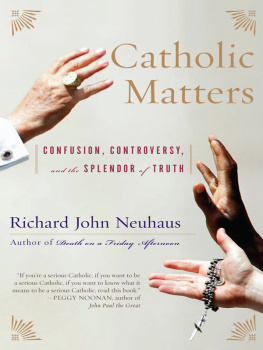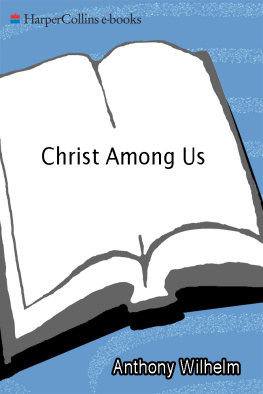The New Evangelization
What It Is and How It Affects the Life of Every Catholic
Ralph Martin
Nihil Obstat
Msgr. Michael Heintz, Ph.D.
Censor Librorum
Imprimatur
 Kevin C. Rhoades
Kevin C. Rhoades
Bishop of Fort Wayne-South Bend
August 16, 2012
The Nihil Obstat and Imprimatur are official declarations that a book is free from doctrinal or moral error. It is not implied that those who have granted the Nihil Obstat and Imprimatur agree with the contents, opinions, or statements expressed.
The Scripture citations used in this work are taken from the Second Catholic Edition of the Revised Standard Version of the Bible (RSV), copyright 1965, 1966, and 2006 by the Division of Christian Education of the National Council of the Churches of Christ in the United States of America. Used by permission.
Quotations from Second Vatican Council documents, papal, and other documents are copyrighted 2012 by Libreria Editrice Vaticana.
Every reasonable effort has been made to determine copyright holders of excerpted materials and to secure permissions as needed. If any copyrighted materials have been inadvertently used in this work without proper credit being given in one form or another, please notify Our Sunday Visitor in writing so that future printings of this work may be corrected accordingly.
Copyright 2012 by Ralph Martin. Published 2012.
17 16 15 14 13 12 1 2 3 4 5 6 7 8 9
All rights reserved. With the exception of short excerpts for critical reviews, no part of this work may be reproduced or transmitted in any form or by any means whatsoever without permission in writing from the publisher. Contact: Our Sunday Visitor Publishing Division, Our Sunday Visitor, Inc., 200 Noll Plaza, Huntington, IN 46750; 1-800-348-2440; email: .
eISBN: 978-1-61278-686-5 (Inventory No.: T1391DB)
Table of Contents
Chapter I
What Is the New Evangelization?
Rooted in Vatican II
Blessed Pope John Paul II spoke about the need for a new evangelization multiple times during his pontificate. When he died, many wondered what would become of this emphasis. It soon became apparent that Pope Benedict XVI would not only continue the call for a new evangelization, but also make it an ongoing focus of the entire Church. Pope Benedict has institutionalized the major emphasis that Blessed John Paul II put on the need for a new evangelization by establishing the Pontifical Council for the Promotion of the New Evangelization and choosing new evangelization as the theme of the October 2012 World Synod of Bishops. The roots, though, of the current papal emphasis on a new evangelization are located in the rationale and documents of the Second Vatican Council, the fiftieth anniversary of which we also are commemorating. The council was called out of a sense that an authentic renewal of the Churchs life was necessary in order to more effectively communicate to the modern world the saving message of Christ.
As Cardinal Avery Dulles has pointed out, there was a significant shift in emphasis from Vatican I to Vatican II:
A simple word count indicates the profound shift in focus. Vatican I, which met from 1869-1870, used the term gospel (evangelium) only once and never used the terms evangelize and evangelization. Less than a century later, Vatican II mentioned the [word] gospel 157 times and used the verb evangelize eighteen times and the noun evangelization thirty-one times. When it spoke of evangelization, Vatican II generally meant the proclamation of the basic Christian message of salvation through Jesus Christ.
Initial Confusion
For the first decade after Vatican II, though, the main focus of many leaders seemed to be on issues such as the sharing of power within the Church, the setting up of consultative bodies such as parish and diocesan councils, the implementation of a vernacular liturgy, the turn toward Christian unity, dialogue with non-Christian religions, and dialogue with the modern world. Accompanying this were multiple theological challenges to the teaching of the Church in the areas of sexual morality, the priesthood, and the very uniqueness and identity of Christ, which spread widespread confusion about what the Church still believed and taught. Some famous theologians gave lectures all over the world talking about Vatican II as just the beginning and pushing for more and more radical change, which led to a disregard for the amazingly beautiful and relevant documents themselves.
It wasnt until 1975 and the publication of Pope Paul VIs Evangelii Nuntiandi (apostolic exhortation on evangelization in the modern world, henceforth abbreviated as EN) that some of the most foundational themes of Vatican II resurfaced. Both Popes Paul VI and John Paul II often summarized the deepest purpose of the council as renewal for the sake of evangelization. As Pope Paul stated it, the purposes of the council are definitively summed up in this single one: to make the Church of the twentieth century ever better fitted for proclaiming the Gospel to the people of the twentieth century (EN, 2). The popes have identified renewal in holiness as the primary renewal that the council called for, and the primary outward fruit of such holiness, a new evangelization.
As Blessed John Paul II stated in his 1990 encyclical on evangelization, Redemptoris Missio (Mission of the Redeemer, henceforth abbreviated as RM):
The call to mission derives, of its nature, from the call to holiness. The universal call to holiness is closely linked to the universal call to mission. Every member of the faithful is called to holiness and to mission. (RM, 90)
What Is the New Evangelization?
Starting in 1983, Pope John Paul II began to frequently call for a and directed in a new way, not only to those who have never heard the Gospel before the traditional mission territories but now also to the lukewarm and de-Christianized traditionally Christian Western nations.
The new evangelization does not consist of a new gospel. Neither does it involve removing from the Gospel whatever seems difficult for the modern mentality to accept. The new evangelization has as its point of departure the certitude that in Christ there are inexhaustible riches (Eph 3:8) which no culture nor era can exhaust. These riches are, first of all, Christ himself, his person, because he himself is our salvation.
He distinguished primary evangelization directed toward those who have never heard the Gospel before, pastoral care directed toward those who were living as believers, and new evangelization or re-evangelization directed toward those from traditionally Christian cultures or backgrounds where entire groups of the baptized have lost a living sense of the faith, or even no longer consider themselves members of the Church, and live a life far removed from Christ and his Gospel (RM, 33). To state it in a simple way, whats primarily new about the new evangelization is whom it is directed toward, the baptized who are not living in an active relationship of discipleship with Jesus. It is also new in the passion and enthusiasm that Blessed John Paul II has stated is essential for its success, along with an openness to the Holy Spirit to show us new methods and expressions of the faith that can communicate with people today. Finally, whats new about the new evangelization is that it is not only the responsibility of priests, nuns, or full time Church employees but of every single Catholic, by virtue of being baptized into the life and mission of Jesus.
The Urgency of a New Evangelization
As Blessed John Paul published his vision, or mission statement,
To nourish ourselves with the word in order to be servants of the Word in the work of evangelization: this is surely a priority for the Church at the dawn of the new millennium. Even in countries evangelized many centuries ago, the reality of a Christian society which, amid all the frailties which have always marked human life, measured itself explicitly on Gospel values, is now gone. Today we must courageously face a situation which is becoming increasingly diversified and demanding, in the context of globalization and of the consequent new and uncertain mingling of peoples and cultures. Over the years, I have often repeated the summons to the
Next page






 Kevin C. Rhoades
Kevin C. Rhoades